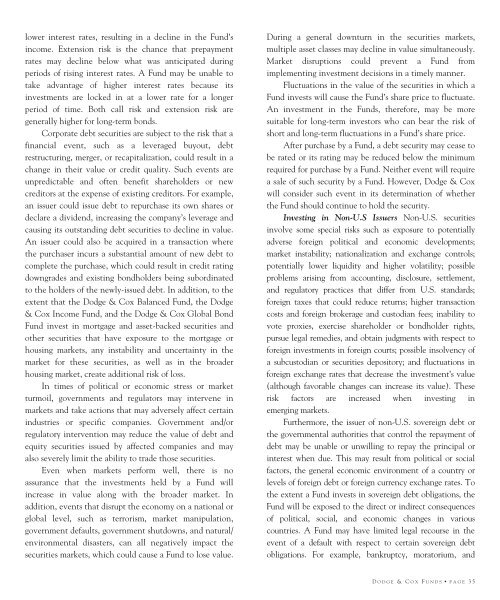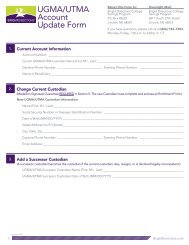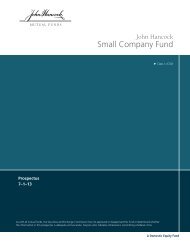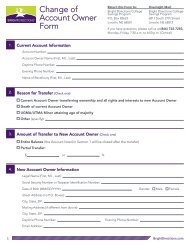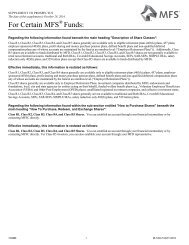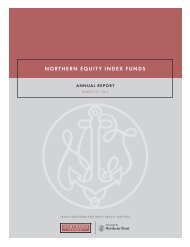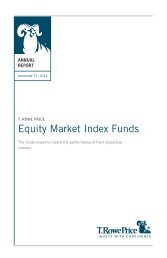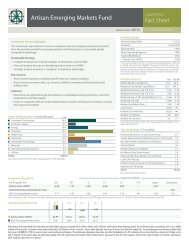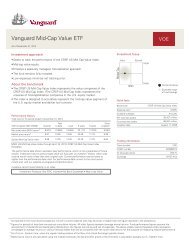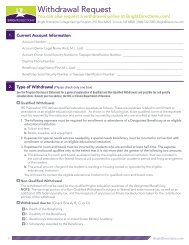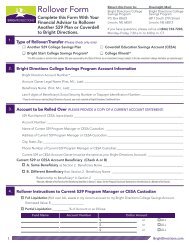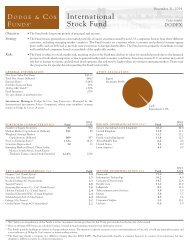Dodge & Cox Funds Statutoary Prospectus dated May 1, 2013
Dodge & Cox Funds Statutoary Prospectus dated May 1, 2013
Dodge & Cox Funds Statutoary Prospectus dated May 1, 2013
Create successful ePaper yourself
Turn your PDF publications into a flip-book with our unique Google optimized e-Paper software.
lower interest rates, resulting in a decline in the Fund’sincome. Extension risk is the chance that prepaymentrates may decline below what was anticipated duringperiods of rising interest rates. A Fund may be unable totake advantage of higher interest rates because itsinvestments are locked in at a lower rate for a longerperiod of time. Both call risk and extension risk aregenerally higher for long-term bonds.Corporate debt securities are subject to the risk that afinancial event, such as a leveraged buyout, debtrestructuring, merger, or recapitalization, could result in achange in their value or credit quality. Such events areunpredictable and often benefit shareholders or newcreditors at the expense of existing creditors. For example,an issuer could issue debt to repurchase its own shares ordeclare a dividend, increasing the company’s leverage andcausing its outstanding debt securities to decline in value.An issuer could also be acquired in a transaction wherethe purchaser incurs a substantial amount of new debt tocomplete the purchase, which could result in credit ratingdowngrades and existing bondholders being subordinatedto the holders of the newly-issued debt. In addition, to theextent that the <strong>Dodge</strong> & <strong>Cox</strong> Balanced Fund, the <strong>Dodge</strong>& <strong>Cox</strong> Income Fund, and the <strong>Dodge</strong> & <strong>Cox</strong> Global BondFund invest in mortgage and asset-backed securities andother securities that have exposure to the mortgage orhousing markets, any instability and uncertainty in themarket for these securities, as well as in the broaderhousing market, create additional risk of loss.In times of political or economic stress or marketturmoil, governments and regulators may intervene inmarkets and take actions that may adversely affect certainindustries or specific companies. Government and/orregulatory intervention may reduce the value of debt andequity securities issued by affected companies and mayalso severely limit the ability to trade those securities.Even when markets perform well, there is noassurance that the investments held by a Fund willincrease in value along with the broader market. Inaddition, events that disrupt the economy on a national orglobal level, such as terrorism, market manipulation,government defaults, government shutdowns, and natural/environmental disasters, can all negatively impact thesecurities markets, which could cause a Fund to lose value.During a general downturn in the securities markets,multiple asset classes may decline in value simultaneously.Market disruptions could prevent a Fund fromimplementing investment decisions in a timely manner.Fluctuations in the value of the securities in which aFund invests will cause the Fund’s share price to fluctuate.An investment in the <strong>Funds</strong>, therefore, may be moresuitable for long-term investors who can bear the risk ofshort and long-term fluctuations in a Fund’s share price.After purchase by a Fund, a debt security may cease tobe rated or its rating may be reduced below the minimumrequired for purchase by a Fund. Neither event will requirea sale of such security by a Fund. However, <strong>Dodge</strong> & <strong>Cox</strong>will consider such event in its determination of whetherthe Fund should continue to hold the security.Investing in Non-U.S Issuers Non-U.S. securitiesinvolve some special risks such as exposure to potentiallyadverse foreign political and economic developments;market instability; nationalization and exchange controls;potentially lower liquidity and higher volatility; possibleproblems arising from accounting, disclosure, settlement,and regulatory practices that differ from U.S. standards;foreign taxes that could reduce returns; higher transactioncosts and foreign brokerage and custodian fees; inability tovote proxies, exercise shareholder or bondholder rights,pursue legal remedies, and obtain judgments with respect toforeign investments in foreign courts; possible insolvency ofa subcustodian or securities depository; and fluctuations inforeign exchange rates that decrease the investment’s value(although favorable changes can increase its value). Theserisk factors are increased when investing inemerging markets.Furthermore, the issuer of non-U.S. sovereign debt orthe governmental authorities that control the repayment ofdebt may be unable or unwilling to repay the principal orinterest when due. This may result from political or socialfactors, the general economic environment of a country orlevels of foreign debt or foreign currency exchange rates. Tothe extent a Fund invests in sovereign debt obligations, theFund will be exposed to the direct or indirect consequencesof political, social, and economic changes in variouscountries. A Fund may have limited legal recourse in theevent of a default with respect to certain sovereign debtobligations. For example, bankruptcy, moratorium, andD ODGE & C OX F UNDS ▪ PAGE 35


